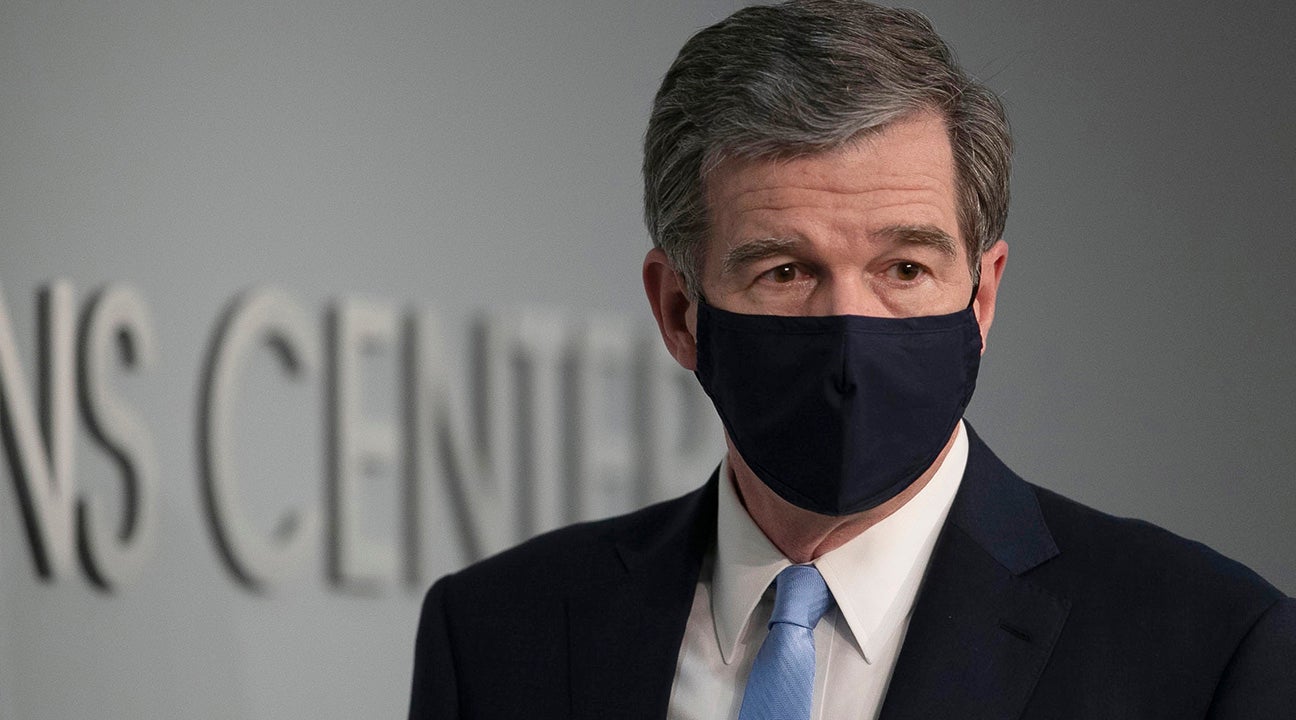Cooper vetoes second reopen bill, this one for N.C. gyms, bars
Published 8:53 am Saturday, June 20, 2020

- North Carolina Governor Roy Cooper arrives for a press briefing on the COVID-19 virus at the Emergency Operations Center on Thursday, June 18, 2020 in Raleigh, N.C. Courtesy NC Department of Public Safety
|
Getting your Trinity Audio player ready...
|
By Gary D. Robinson, Associated Press
Democratic Gov. Roy Cooper on Friday vetoed another attempt by Republican legislators to accelerate the speed in which North Carolina commerce is being restored through his COVID-19 executive order.
The vetoed measure would have allowed fitness centers and gyms shuttered since March to reopen at 50% capacity and require they follow social distancing and cleanliness rules. The bill also tried again to let still-closed bars reopen for outdoor patrons only and expand current outdoor seating for restaurants already partially reopened for sit-down service.
Two weeks ago, Cooper vetoed a bill containing help for bars and restaurants, saying legislation was the wrong way to reopen during uncertain times in which virus cases could spike. The bill vetoed Friday had offered the governor the authority to still shut down the bars and gyms under his emergency powers, but only with the agreement of the Council of State. The veto shows the “fail-safe” legislators said they gave him wasn’t enough.
“Tying the hands of public health officials in times of pandemic is dangerous, especially when case counts and hospitalizations are rising,” Cooper said in his veto message. “The bill could restrict leaders who need to respond quickly to outbreaks and protect public health and safety.”
Cooper’s latest executive order expires June 26, and the governor said he’ll announce early next week whether it will be extended or modified to reopen still-closed businesses struggling to survive financially. Cooper has said decisions have been made on science and the data, which recently have had Cooper worried.
The state reported yet another record number of current COVID-19 hospitalizations on Friday with more than 870 patients. The number of positive cases since the pandemic neared 50,000 overall and the number of deaths was almost 1,200, according to Department of Health and Human Services data.
Legislators and owners of still-closed businesses said Cooper is arbitrarily picking financial winners and losers. Several lawsuits have also been filed challenging his executive orders.
“Why is it safe to have a drink outside at a restaurant, but it’s dangerous to have a drink outside at a bar?” asked Sen. Rick Gunn, an Alamance County Republican, who shepherded the vetoed bill. Gunn called it an “economic lifeline for thousands of businesses across North Carolina.” Lawmakers could attempt to override the veto. More than 10 Democrats voted for the bill.
Cooper’s veto stamp seems to have only intensified the resolve of Republicans to send him more bills that challenge his executive orders or preserve activities halted in the name of safety.
The GOP-controlled legislature is sending another bill to Cooper’s desk to allow skating rinks and bowling alleys to reopen at reduced capacities.
The Senate also voted Friday to extend similar reopenings to amusement and water parks, wedding reception venues and fairs and carnivals. The measure, which needs just one more House vote, even would allow restaurants inside stadiums that can hold up to 12,000 spectators to serve patrons up to 10% of a stadium’s seating capacity.
Even July 4 parades and fireworks would be protected from cancellations in another Senate measure on Friday. Parades and festivals are limited under Cooper’s current order to no more than 25 people.
The bill is “just to make clear that while peacefully protesting is as American as apple pie, so is celebrating the 4th of July,” Burke County GOP Sen. Warren Daniel, a bill sponsor. He added an amendment that also would make it difficult for local governments to refuse a permit to hold Independence Day festivities between July 1-10.
Sen. Natasha Marcus, a Mecklenburg County Democrat, opposed the measure, saying some localities may consider the pandemic threat a good reason to keep people from gathering. “You wouldn’t be able to protect public health as you see fit.” The bill was approved 21-8.
Legislation receiving strong bipartisan support would override rules by public and private hospitals barring patient visitation during the pandemic. The bill would demand that hospitals allow at least one person to visit a patient during a public health emergency or disaster. A visitor would be subject to health screenings.
The Department of Health and Human Services is worried about the bill as it relates to controlling hospital infections, but hopes to see new bill language that ensures it complies with federal laws, the department said on Friday in a statement.
READ ABOUT MORE NEWS AND EVENTS HERE.
RECENT HEADLINES:
In Dare, face coverings must be worn in public spaces starting Sunday




